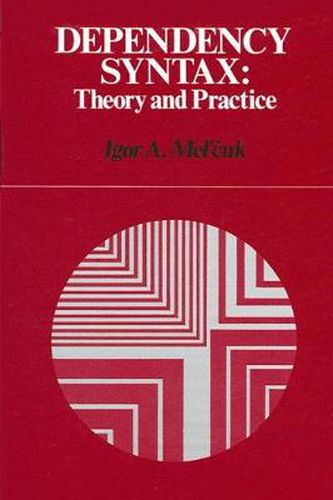Readings Newsletter
Become a Readings Member to make your shopping experience even easier.
Sign in or sign up for free!
You’re not far away from qualifying for FREE standard shipping within Australia
You’ve qualified for FREE standard shipping within Australia
The cart is loading…






This work presents the first sustained examination of Dependency Syntax. In clear and stimulating analyses Mel'cuk promotes syntactic description in terms of dependency rather than in terms of more familiar phrase-structure. The notions of dependency relations and dependency structure are introduced and substantiated, and the advantages of dependency representation are demonstrated by applying it to a number of popular linguistic problems, e.g. grammatical subject and ergative construction. A wide array of linguistic data is used - the well-known (Dyirbal), the less known (Lezgian), and the more recent (Alutor). Several exotic cases of Russian are discussed to show how dependency can be used to solve difficult technical problems. The book is not only formal and rigorous, but also strongly theory-oriented and data-based. Special attention is paid to linguistic terminology, specifically to its logical consistency. The dependency formalism is presented within the framework of a new semantics-oriented general linguistic theory, Meaning-Text theory.
$9.00 standard shipping within Australia
FREE standard shipping within Australia for orders over $100.00
Express & International shipping calculated at checkout
This work presents the first sustained examination of Dependency Syntax. In clear and stimulating analyses Mel'cuk promotes syntactic description in terms of dependency rather than in terms of more familiar phrase-structure. The notions of dependency relations and dependency structure are introduced and substantiated, and the advantages of dependency representation are demonstrated by applying it to a number of popular linguistic problems, e.g. grammatical subject and ergative construction. A wide array of linguistic data is used - the well-known (Dyirbal), the less known (Lezgian), and the more recent (Alutor). Several exotic cases of Russian are discussed to show how dependency can be used to solve difficult technical problems. The book is not only formal and rigorous, but also strongly theory-oriented and data-based. Special attention is paid to linguistic terminology, specifically to its logical consistency. The dependency formalism is presented within the framework of a new semantics-oriented general linguistic theory, Meaning-Text theory.